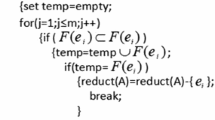Abstract
Soft set theory is an important tool for dealing with problems involving uncertainty. In a soft set, parameter set is a classical set. In this study, we introduce parameter trees by using mappings from parameter set into power set of parameter set and investigate some properties of them. We also define operations between two parameter trees and obtain some of their properties. Furthermore we give a similarity measure method between parameter trees.








Similar content being viewed by others
Explore related subjects
Discover the latest articles, news and stories from top researchers in related subjects.Data availability
We don’t use any real data. Therefore, we do not have any data to make statement about its availability.
References
Acharjee S (2017) New results for Kharal’s similarity measures of soft sets. New Math Nat Comput 13(1):5–60
Ali MI, Feng F, Liu X, Min WK, Shabir M (2009) On some new operations in soft set theory. Comput Math Appl 57:1547–1553
Atanassov K (2007) Soft sets and soft groups. Fuzzy Sets Syst 20:87–96
Çağman N (2014) Contributions to the theory of soft sets. J New Results Sci 4:33–41
Çağman N, Enginoğlu S (2010) Soft set theory and uni–int decision making. Eur J Oper Res 207:848–855
Çağman N, Enginoğlu S (2012) Fuzzy soft matrix theory and its application in decision making. Iran J Fuzzy Syst 9(1):109–119
Çağman N, Karataş S (2013) Intuitionistic fuzzy soft set theory and its decision making. J Intell Fuzzy Syst 24:829–836
Feng Q, Zhou Y (2014) Soft discernibility matrix and its applications in decision making. Appl Soft Comput 24:749–756
Feng F, Jun YB, Zhao X (2008) Soft semirings. Comput Math Appl 56(10):2621–2628
Feng F, Li Y, Çağman N (2012) Generalized uni–int decision making schemes based on choice value soft sets. Eur J Oper Res 220:162–170
Karaaslan F (2013) Soft trees and their decision making techniques. PhD Thesis (in Turkish), Graduate School of Natural and Applied Sciences, Gaziosmanpasa University, Tokat, Turkey
Kharal A (2010) Distance and similarity measures for soft sets. New Math Nat Comput 6(3):321–334
Ma X, Zhan Z (2014) Soft intersection h-ideals of hemirings and its applications. Ital J Pure Appl Math 32:301–308
Maji PK, Biswas R, Roy AR (2003) Soft set theory. Comput Math Appl 45:555–562
Maji PK, Roy AR, Biswas R (2002) An application of soft sets in a decision making problem. Comput Math Appl 44:1077–1083
Majumdar P, Samanta SK (2008) Similarity measure of soft sets. New Math Nat Comput 4(1):1–12
Molodtsov DA (1999) Soft set theory-first results. Comput Math Appl 37:19–31
Pawlak Z (1982) Rough sets. Int J Comput Inf Sci 11:341–356
Roy AR, Maji PK (2007) A fuzzy soft set theoretic approach to decision making problems. J Comput Appl Math 203:412–418
Sezgin A, Atagün AO (2011) On operations of soft sets. Comput Math Appl 61:1457–1467
Xiao Z, Li Y, Zhong B, Yang X (2003) Research on synthetically evaluating method for business competitive capacity based on soft set. Stat Methods Med Res 52–54
Zadeh LA (1965) Fuzzy sets. Inf Control 8:338–353
Funding
There is no financial support for the study.
Author information
Authors and Affiliations
Contributions
F. Karaaslan developed the theoretical formalism and gave the examples. Both F. Karaaslan and N. Çağman contributed to the final version of the manuscript. N. Çağman supervised the manuscript.
Corresponding author
Ethics declarations
Conflict of interest
The authors declare that there is no conflict of interests regarding the publication of this paper.
Additional information
Publisher's Note
Springer Nature remains neutral with regard to jurisdictional claims in published maps and institutional affiliations.
Rights and permissions
About this article
Cite this article
Karaaslan, F., Çağman, N. Parameter trees based on soft set theory and their similarity measures. Soft Comput 26, 4629–4639 (2022). https://doi.org/10.1007/s00500-022-06932-0
Accepted:
Published:
Issue Date:
DOI: https://doi.org/10.1007/s00500-022-06932-0




